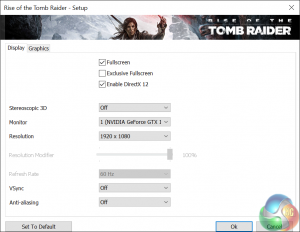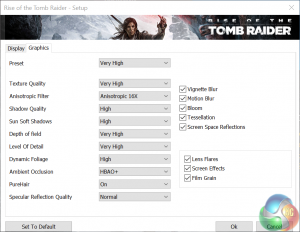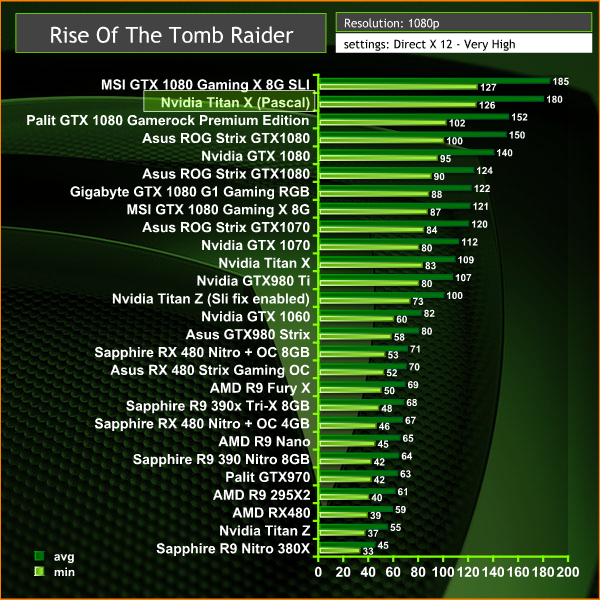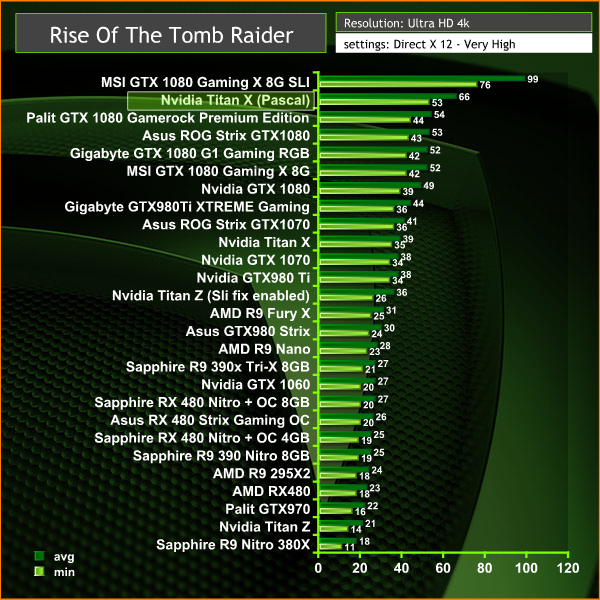Rise of the Tomb Raider is a third-person action-adventure game that features similar gameplay found in 2013's Tomb Raider. Players control Lara Croft through various environments, battling enemies, and completing puzzle platforming sections, while using improvised weapons and gadgets in order to progress through the story. It uses a Direct X 12 capable engine.
We enable Direct X 12, Vsync is off and graphics are set to the ‘very high' profile, shown above. We test the Nvidia Titan Z with the SLi optimisation both disabled, then enabled. This is clearly marked in the graph. See more HERE.
Performance from the new Titan X is at the top of our chart, beating out the fastest GTX 1080 we have tested (The Palit GTX 1080 Gamerock Premium Edition).
 KitGuru KitGuru.net – Tech News | Hardware News | Hardware Reviews | IOS | Mobile | Gaming | Graphics Cards
KitGuru KitGuru.net – Tech News | Hardware News | Hardware Reviews | IOS | Mobile | Gaming | Graphics Cards








I may be inclined to getting two 1080’s before I ever get a Titan. o,O
Clocks on your overclock seem a bit conservative – I’ve managed to hold a stable +235 core / 675 memory on both cards, giving me a base clock of 1655 and boost to 1770, with a memory clock of 1420, giving me 11300 effective.
Final boost with their boost 3.0 puts me in the 2150-2180 core clock range. Can’t wait to stick waterblocks on them.
and take the wife for supper , damn! 😉
the joys of the silicon lottery I am afraid. I have recently got another Titan X, and it overclocks quite a bit higher.
Yeah it seems I’ve gotten lucky – really lucky in fact, over the last few years. These tx-p’s of mine both top out near 2200 core / 11500 mem, my previous tx-maxwell’s could boost to a shade over 1550 core, and my 5960x can sustain 5.1ghz across all cores @ 1.42v, and I can push a single core to 5.6GHz. Feels like I get danmed lucky, a lot.
Waterblocks for the tx-p’s have become a more complicated problem though – I was planning on going with EKWB for the setup, but it seems the nvidia HB sli bridge the pascal cards use won’t fit with their pascal blocks, so I’ll need another solution there.
It’s kind of crazy to think that if you notice, it took in most cases until the Pascal Titan X and in others the 1080 to beat the 295×2 in a lot of benchmarks. Kind of neat that even if you bought the 295×2 at full retail of $1500USD (in the states) in took two years, a node shrink from 28nm to 16nm, and a Video Card costing $1200 to beat it in a lot of cases.
Are they not benchmarking Doom in Vulkan?
It’s neat that a single card with only around 70% of the shader cores can be equal in performance and consume half the power.
The 295×2 was fast no doubt about it, but by no means was it particularly impressive. Hot as hell, and needed a beastly power supply to feed it. And thats without overclocking.